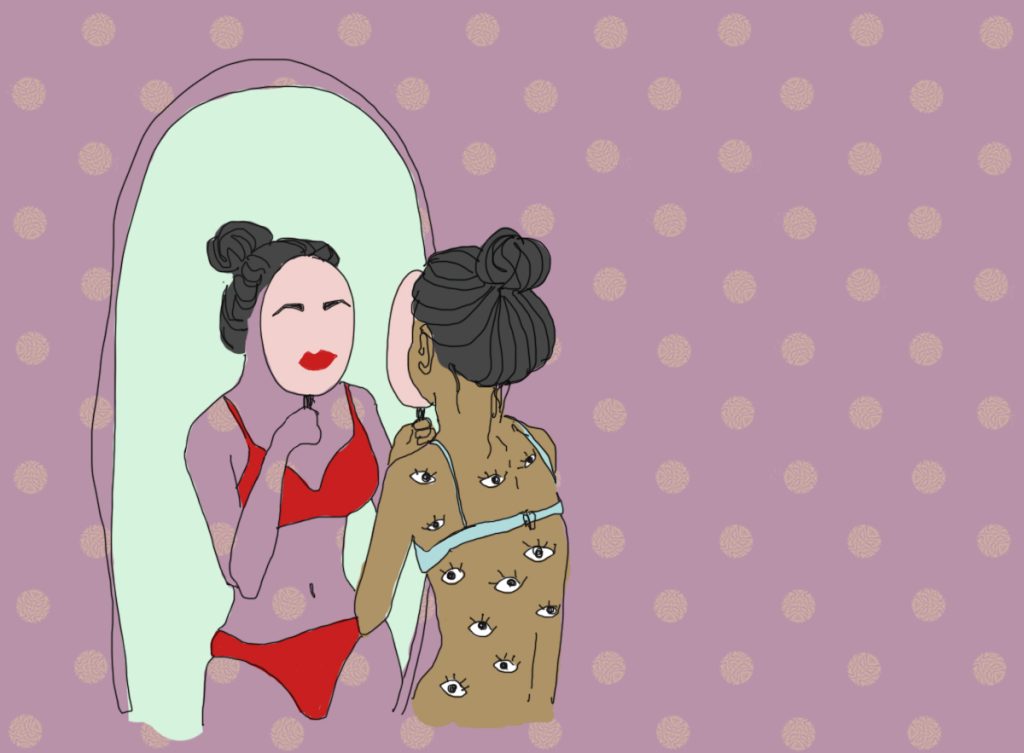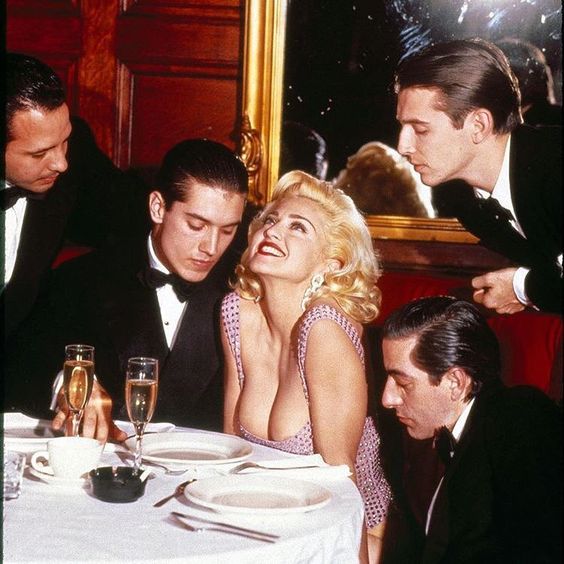The male gaze is a social and cultural phenomenon.
Women are the second sex to be looked at, while men enjoy the pleasure of voyeurism through various media and channels, becoming the first sex to watch and gaze. When discussing the issue of “gaze,” many theorists point out that people usually “naturalize” the “male gaze” and make it the dominant viewing behavior.
In the traditional power model and division of labor model, women are in an absolutely disadvantaged position, while men sit on fame, fortune, and power and “stare” at women from a top-down perspective. Social norms have also formalized and normalized this relationship between gazing and being gazed at and developed detailed and numerous “verbal teachings” that limit women’s sight and gaze range while encouraging men’s strong posture.
Jean-Paul Sartre introduced le regard, or gaze, as part of his existentialist philosophy in Being and Nothingness. Le regard emphasizes how gazing creates an imbalanced power dynamic between individuals, as those gazing create an impactful power difference that impacts not just one but both individuals involved as subjects of gazing are perceived more as objects rather than fellow human beings.
Laura Mulvey’s essay “Visual Pleasure and Narrative Cinema” further investigates the cinematic concept of the male gaze. Authoring it herself, Mulvey presents, explains, and elaborates on sexual inequality as manifest in an uneven distribution of social and political power between genders that plays an essential part in cinematic portrayals of both genders, especially male viewers, due to patriarchal ideologies and discourses that define and promote male gaze aesthetic pleasure as a social construct.
Scopophilia

Two types of male gaze were born out of the Freudian concept of scopophilia. one that is associated with the pleasure of sexual attraction and can be described as extreme voyeurism, while the other is akin to the enjoyment of a scopophilic relationship that can be attributed to narcissistic identity, which involves an ego-centric projection ideal. Both forms of the male gaze illustrate how society’s demands have forced women to see film through the lens of male gazes, which encompasses perspectives of aesthetics, sexuality, and culture.
When it comes to cinematic depictions of females, it is the male gaze that operates to deny the female’s personal identity and agency by transforming her individual autonomy into an object. It categorizes her by her physical appearance, beauty, and sexual attraction. This is all in keeping with the sexual fantasies of men that are so prevalent in the cinematic narrative.
Is It Harmful?
No doubt there are differing views regarding the impact and significance of male gaze; opinions vary as to its evolution or stagnancy since it was first brought into public awareness nearly 50 years ago. Yet most accept its foundations are intrinsically sexist, patriarchal, and misogynist; many claim its influence remains pervasive within society’s attitudes and cultural representations.
Changing the Gaze
Recognition of the male gaze is vital to breaking free from its influence, as simply acknowledging it can reduce many of its detrimental effects, helping you view yourself and navigate life authentically without needing to conform.
Deliberately seeking portrayals of women and girls that challenge stereotypes associated with the male gaze can also contribute to dislodging its hold over our collective minds. At last, I would like to address all females: abandon the concerns about being observed and the social norms that define femininity; then you could be yourself and embrace your identities.


Wow! Very detailed post – I like that you talked about the male gaze more specifically regarding scopophilia and voyeurism as that is definitely a very interesting perspective into this concept. What are your personal thoughts on the female gaze? Any examples?
You use a very classic video shot on the cover to express your theme to us succinctly – the male gaze.
Your content is very concise and clear on the subject, the male gaze is a social and cultural phenomenon, explain its basic definition and your personal explanation in text.
Your content also references Freud’s concept of pedophilia and gives your personal explanation, which gives me a better understanding of what the harm of the male gaze is in society. This is very novel, so far you are the first one I have seen using this example!
Thank you so much for sharing!
Hello Jingjing,
Firstly, I must talk about how excellent the blog title is! It really stands out from all the other blogs. I had never read or heard about scopophilia before, so it was really informative for me; I was wondering as I read about it, as you mentioned that because of society, women started acting or looking at themselves in a male perspective, do you think women dress up or work to pleasure men? or is it just the men thinking that we act a sure way to please them or get their attention?